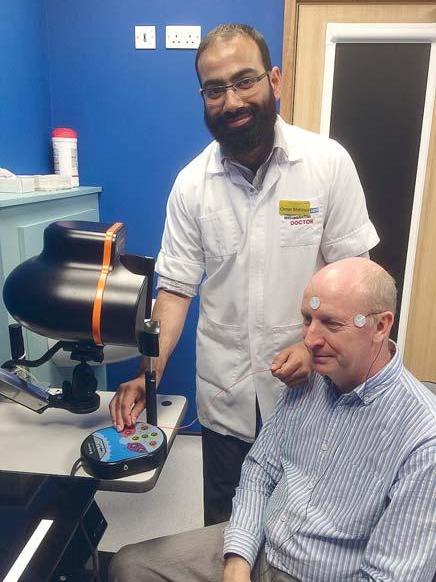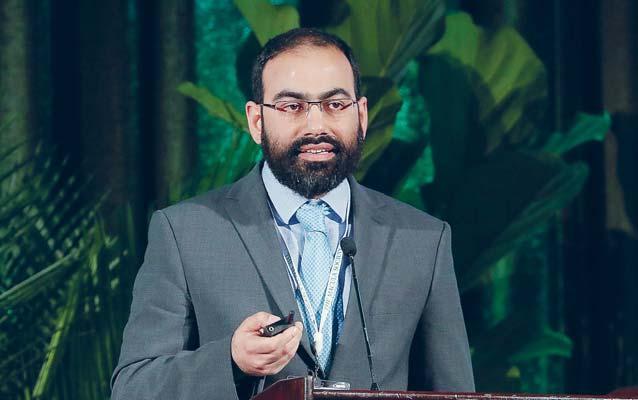
5 minute read
FROM J1Y TO CLINICIAN SCIENTIST OMAR MAHROO
FROM J1Y TO CLINICIAN SCIENTIST
BY OMAR MAHROO (86-96)
Advertisement
The morning after Prize Day was the deadline for the notorious Geography Project. I’d worked on it for months and had stayed up all night finishing it. I explained, bleary-eyed, to my History teacher that I hadn’t been able to complete his homework, but would do so as soon as possible. He was furious, put me in lunchtime detention, and said that marks would be docked from my Geography Project (that bit hurt the most!).
My final morning class finished late, making me late for detention. ‘Seen the time, Mahroo?’ he inquired. I misunderstood: thinking he wanted to know the time, I told him what it was. He misunderstood: interpreting my answer as insolence, he put his face very close to mine: ‘You think you can take me on? You won’t win, Mahroo, you won’t WIN!’. The happy ending is that he decided against asking docking marks as ‘that would be below the belt’ and I’d learned my lesson!
Perhaps not the healthiest example (albeit colourful), it illustrates the work ethic which RGS instilled in me, and which I think has stood me in good stead. Dr Mains (76-05), the teacher above, was immensely engaging, filling me with such passion for the subject that I remember, after my exam, reading all of the parts of Mastering Modern British History that weren’t on the course. The teaching standard was high across the board.
I am now a Consultant Ophthalmologist at Moorfields Eye Hospital and St Thomas’ Hospital, and Associate Professor at UCL. I investigate mechanisms of retinal diseases, which are a major cause of blindness. I was awarded a competitive £1.1 million Wellcome Trust grant to fund my research programme, and I received a ‘Rising Star’ award from the Macular Society last year. My time at the RGS, from 1986 (J1Y – ‘Ys are wise, and better than Xs’, and other ingenious adages I still recall … and very much live by) to 1996, was a formative decade which undoubtedly shaped the subsequent two (and a half). Space permits only a few reflections.
I was the only RGS boy in my year to be accepted at Cambridge to read Medicine. The College I entered, Caius, had already been impressed by Nadeem Ali (84-94), who had topped the Part IA Cambridge exams.
Thankfully, I didn’t drop the standard too far, and achieved a First Class every year. Our exams were largely essay-based, and I was retrospectively grateful for the many essays Tim Bolton-Maggs (74-04) had set us in A Level Biology. Moreover, my writing style had already undergone years of cultivation by RGS English teachers. Dr Jones-Lee (84-09) cautioned us against the word ‘nice’ (I now use ‘great’ – problem solved!). Mr Marriott (85-94) taught me how to structure an argument, though he might be horrified that I employ these skills in scientific papers, rather than erudite expositions of the themes of Hardy’s novels. In medicine and science (in life), communication is central – with patients, colleagues, the scientific community (history teachers). Potentially transformative discoveries go unnoticed if not communicated appropriately. My publications owe much to my English teachers.
During my medical degree, I completed a PhD in retinal physiology. As my brain throbbed, deriving equations for simultaneous bleaching and regeneration of the retina’s light-sensitive pigment, I recall suddenly realising that the abstract techniques (differential equations, imaginary numbers) whose usefulness I had questioned at school were now enabling truly novel discoveries (which we later published in the Journal of Physiology). I am indebted to my Maths teachers (Perella (82-03), Douglas (56-94), Watkins (88-18)) for the Maths, and love of Maths, they imparted (and to another member of said department who forgot to enter me for my A Level in time, meaning I had to unnecessarily revise for and repeat an exam in which I had already achieved 97%).
I currently see patients with rare genetic retinal diseases. When interpreting genetic reports, I still visualise the lesson in which Mr Bolton-Maggs taught us the Central Dogma. By curious coincidence, I remember simultaneously learning, in Biology, that the language of life was based on three-letter-codons (sometimes one letter could interchange with another with the same meaning), whilst, in General Studies, Mr Squires (72-17) was teaching me that all Arabic words were based on three-letter roots (sometimes one letter could interchange with another with the same meaning). The other sciences—Physics, Burchell (66-99); Chemistry, Goldie (89-03); Lawson (83-09)—were also excellently taught, as were non-science subjects. The latter rounded my education and it pained me to drop them at A Level. French (the phenomenal Mrs Sainsbury (80-05)) comes in useful when attending conferences in France (the talks are in English, but the French helps in getting around). Learning Latin (inspirational Mr Keating (72-04)), I have discovered, did have a purpose: I can help my children with their Latin! (Actually, it made learning Arabic simpler, made medical terms more familiar, and might prove invaluable if I ever need to attend a scientific meeting in 1st century Pompeii.)
Beyond the academic, I found the extra-curricular RGS environment rich (admittedly I was rubbish at sports other than badminton). In Junior School, some of us got to star in a video recorded by Paul McCartney. (Strange that Paul and I never recorded any songs together after that!) I was active in Voluntary Service and the CCF, and enjoyed all of the trips. I formed strong friendships – the healthy peer environment was in some ways as important as the teaching (plus there was a kid who’d get you any Amiga game you’d like if you gave him a floppy disk in break time). RGS banter shaped my wit (though I realised, I don’t know how long later, that some things we dismissed as schoolboy banter could cause hurt). I value hugely the pastoral guidance I received from Dr Barker, and the thought-provoking discussions we had.
In one of my first termly reports at Cambridge, my Physiology Supervisor (the late Roger Carpenter) started with the phrase, ‘A powerful intelligence’, which made me blush. I’m grateful to the RGS (including those teachers not mentioned above) for nurturing that ‘intelligence’, and hope that I can deliver on their investment. As teaching is part of my role, I also hope I can enthuse others to learn as they did me.











